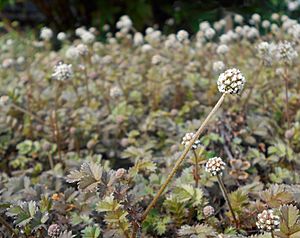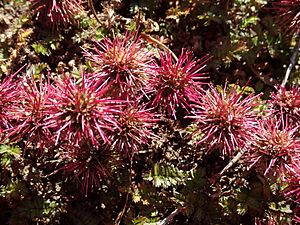Bidibid facts for kids
Quick facts for kids Bidibid |
|
|---|---|
 |
|
 |
|
| Conservation status | |
|
Invalid status (NZ TCS)
|
|
| Scientific classification |
|
| Kingdom: | Plantae |
| Clade: | Tracheophytes |
| Clade: | Angiosperms |
| Clade: | Eudicots |
| Clade: | Rosids |
| Order: | Rosales |
| Family: | Rosaceae |
| Genus: | Acaena |
| Species: |
A. microphylla
|
| Binomial name | |
| Acaena microphylla |
|
| Script error: The function "autoWithCaption" does not exist. | |
Script error: No such module "Check for conflicting parameters".
Acaena microphylla, also known as bidibid or piripiri, is a small plant. Outside of New Zealand, it is sometimes called the New Zealand-bur. This plant is a herb that grows low to the ground. It lives for many years, making it a perennial plant. Bidibid is part of the rose family, called Rosaceae. You can find it naturally in both the North and South Islands of New Zealand.
There are two main types, or varieties, of Acaena microphylla:
- Acaena microphylla var. pauciglochidiata Bitter
- Acaena microphylla Hook.f var. microphylla
Contents
What Does Bidibid Look Like?
Acaena microphylla is a very small plant. It has smooth leaves that are less than a quarter of an inch long. The plant produces round flower heads. These flower heads are quite large compared to the plant's size. They can be over an inch wide, including their spines. These spines are not barbed, which helps tell this species apart from others.
How Did Bidibid Get Its Name?
The plant Acaena microphylla was first officially described in 1852. This was done by a scientist named Joseph Dalton Hooker.
The first part of its name, Acaena, comes from an ancient Greek word. Akaina means "thorn" or "spine." This name makes sense because many plants in the Acaena group have spiny parts. These spines are found on the calyx, which is the outer part of the flower.
The second part of the name, microphylla, also comes from Greek words. Mikros means "small," and phyllon means "leaf." So, microphylla means "small-leaved." This perfectly describes the plant's tiny leaves.
Where Does Bidibid Grow?
You can find Acaena microphylla in New Zealand. It grows on both the North Island and the South Island.
Is Bidibid in Danger?
Scientists keep track of how many plants are left in the wild. This helps them know if a plant is in danger. In 2013, one type of bidibid, Acaena microphylla var. pauciglochidiata, was listed as "At Risk - Naturally Uncommon." This means it was not very common to begin with.
By 2018, its situation got worse. Its status changed to "At Risk - Declining." This happened because the number of these plants was actually going down. The area where they grew became much smaller, less than 100 square kilometers. Scientists also predicted that its numbers would drop by 10 to 50 percent.
However, the other type, Acaena microphylla var. microphylla, is doing much better. It was listed as "Not Threatened" in 2004, 2009, 2012, and again in 2018.
See also
 In Spanish: Acaena para niños
In Spanish: Acaena para niños
 | Janet Taylor Pickett |
 | Synthia Saint James |
 | Howardena Pindell |
 | Faith Ringgold |

